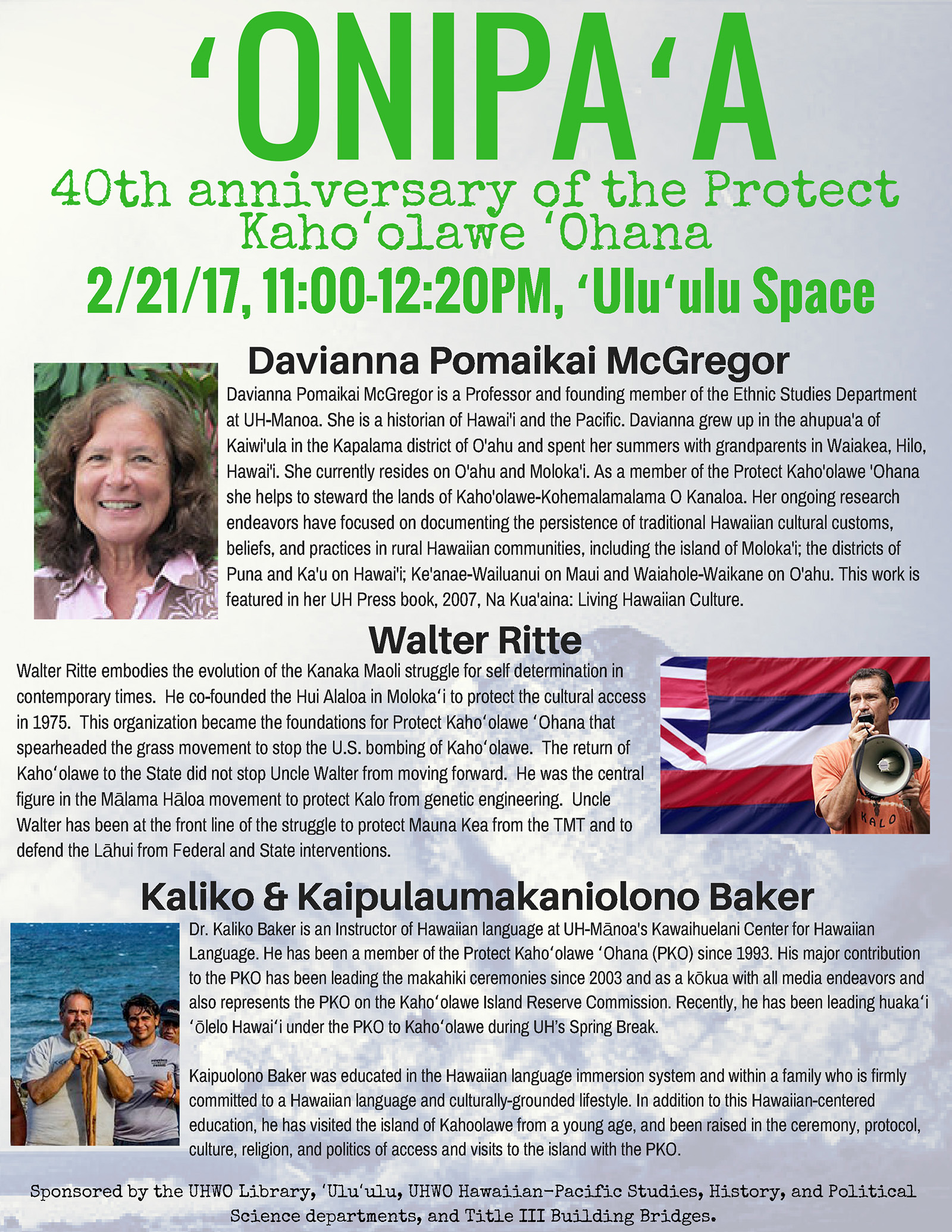The second installation of ʻOnipaʻa 2017 features the 40th anniversary of the first landing on Kaho‘olawe on January 4 by the Protect Kahoʻolawe ʻOhana to protest the bombing of the island and its sacred sites by the U.S. military. This movement to protect Kaho‘olawe not only led to the end of the bombing of the island, but it also led to a greater consciousness of aloha ‘āina across the pae ‘āina.
Join students, faculty, and staff at ʻOnipaʻa on Feb. 21, from 11 a.m. to 12:20 p.m., in the ʻUluʻulu Exhibit Space to gain a deeper understanding of the lessons and legacies of ʻonipaʻa within the context of aloha ʻāina and the Protect Kahoʻolawe ʻOhana. Featuring Uncle Walter Ritte, Dr. Davianna Pōmaikaʻi McGregor, Dr. Kaliko Baker and Kaipu Baker.

‘Onipa‘a flyer
Speaker bios:
Davianna Pomaikai McGregor is a Professor and founding member of the Ethnic Studies Department at UH Mānoa. She is a historian of Hawaiʻi and the Pacific. Davianna grew up in the ahupuaʻa of Kaiwiʻula in the Kapalama district of Oʻahu and spent her summers with grandparents in Waiākea, Hilo, Hawaiʻi. She currently resides on Oʻahu and Molokaʻi. As a member of the Protect Kahoʻolawe ʻOhana she helps to steward the lands of Kahoʻolawe-Kohemalamalama O Kanaloa. Her ongoing research endeavors have focused on documenting the persistence of traditional Hawaiian cultural customs, beliefs, and practices in rural Hawaiian communities, including the island of Molokaʻi; the districts of Puna and Kaʻu on Hawaiʻi; Keʻanae-Wailuanui on Maui and Waiahole-Waikane on Oʻahu. This work is featured in her UH Press book, 2007, Na Kuaʻaina: Living Hawaiian Culture.
Walter Ritte embodies the evolution of the Kanaka Maoli struggle for self determination in contemporary times. He co-founded the Hui Alaloa in Molokaʻi to protect the cultural access in 1975. This organization became the foundations for Protect Kahoʻolawe ʻOhana that spearheaded the grass movement to stop the U.S. bombing of Kahoʻolawe. The return of Kahoʻolawe to the State did not stop Uncle Walter from moving forward. He was the central figure in the Mālama Hāloa movement to protect Kalo from genetic engineering. Uncle Walter has been at the front line of the struggle to protect Mauna Kea from the TMT and to defend the Lāhui from Federal and State interventions.
Dr. Kaliko Baker is an Instructor of Hawaiian language at UH Mānoa’s Kawaihuelani Center for Hawaiian Language. He has been a member of the Protect Kahoʻolawe ʻOhana (PKO) since 1993. His major contribution to the PKO has been leading the makahiki ceremonies since 2003 and as a kōkua with all media endeavors and also represents the PKO on the Kahoʻolawe Island Reserve Commission. Recently, he has been leading huakaʻi ʻōlelo Hawaiʻi under the PKO to Kahoʻolawe during UH’s Spring Break.
Kaipu Baker was educated in the Hawaiian language immersion system and within a family who is firmly committed to a Hawaiian language and culturally-grounded lifestyle. In addition to this Hawaiian-centered eduction, he has visited the island of Kahoolawe from a young age, and been raised in the ceremony, protocol, culture, religion, and politics of access and visits to the island with the PKO. As a young adult, Kaipu Baker is being invited to share his perspectives and knowledge as a representative of a young and upcoming generation of Kanaka Maoli who are well-grounded in cultural practice and fluent in Hawaiian, and who are using their knowledge to make their own way in the world–in the paths of their parents and ancestors, but also through forging their own paths.
ʻOnipaʻa is sponsored by the UHWO Library, ʻUluʻulu, Hawaiian-Pacific Studies, History, and Political Science departments, and Title III Building Bridges.
